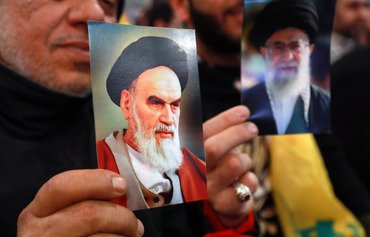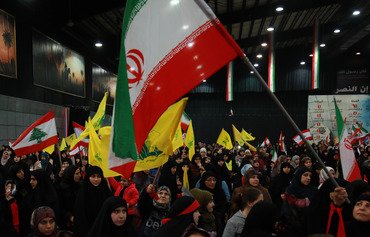As Iran's economy reels from the impact of sanctions, its Islamic Revolutionary Guard Corps (IRGC) has been forced to cut back on the money it funnels to regional proxies, including Lebanon's Hizbullah, experts told Al-Mashareq.
Hizbullah had been receiving hundreds of millions of dollars from the IRGC, but has been forced to cut back expenditures as the IRGC suffers a loss in revenue.
According to the International Monetary Fund, the inflation rate in Iran has risen to 30% as a result of sanctions, and the riyal has lost more than half its value.
"Due to the US sanctions and their negative impact on the Iranian riyal, which can no longer be used in international transactions, the IRGC is stockpiling as much gold and other hard currencies" as possible, a financial expert said.
The IRGC has the power to issue legislation to serve its own interests, said the expert, speaking to Al-Mashareq on condition of anonymity, and has been importing gold through affiliated businesses or through neighbouring countries.
This is being done in exchange for oil and gas, he said.
"Some Asian companies used to perform these operations for the IRGC in the past in exchange for large commissions, and were thus able to circumvent the US blockade," he said.
"Iran used to earmark large sums of money for its affiliates, such as (Lebanon's) Hizbullah, (Yemen's) Houthis (Ansarallah) and (Iraq's) Asaib Ahl al-Haq, who were strategic elements of its expansion in the region," he said.
But the $500 million that Hizbullah used to receive from Iran, for example, has now been cut by half as a result of the effect of US sanctions, he said, noting this in turn forced Hizbullah to halve the salaries of its fighters.
Signs of fiscal austerity
Meanwhile, the Iranian people "are struggling to secure a livelihood amid difficult economic and social circumstances, and are denouncing on social media the assistance that is going to others when they are more entitled to it", he said.
Private sector workers are the hardest hit by the sanctions, as the unemployment rate is on the rise and expected to hit 15.4% by the end of 2019, according to IMF projections.
The Iranian government has said its budget deficit will top $5.8 billion this year.
"The situation will get worse because people are reeling from the high prices," he said, and this portends a social disaster that could lead to popular protests similar to those of 2017.
Signs of fiscal austerity also are evident in Hizbullah's institutions and with its collaborators, Lebanese Centre for Research and Consulting head Hassan Qutb told Al-Mashareq.
Monthly assistance has been cut off to many partisan groups that are loyal to the militia in Lebanon, he said, adding that some Hizbullah leaders are privately saying assistance has been reduced to "unprecedented levels".
Fiscal austerity has led to a decline in pro-Hizbullah media output and social activities that used to be held in its support and in support of Iran, he said.
"There is serious talk of a decline in the financial resources of [Hizbullah affiliated] al-Manar TV, as evident from the drop in the number of media reports and coverage of many activities and occasions," said Qutb.
Qutb said the financial crisis "also has impacted the [Hizbullah] popular support base, as many commercial establishments have closed their doors in al-Nabatiyeh, Tyre, the southern suburb [of Beirut] and the Bekaa".
These areas used to be financially prosperous and economically vibrant owing to the money pumped into them by the militia and the employment and services it provided to its supporters, he said.
Alternative funding sources
Hizbullah "has begun looking for quick alternative sources of funding after the ban on the transfer of money from Iran", said Hussein Ezzedine of Lebanon's Assembly for Sovereignty.
To secure funding after the imposition of sanctions, Hizbullah has attempted to invest under the names of its supporters in a chain of amusement parks, restaurants and attractions in areas where it has influence, he told Al-Mashareq.
The militia also purchased a number of private hospitals and opened laboratories under the names of various individuals, "offering physicians a portion of the profit if they refer their patients to its laboratories", he said.
It is generating money "by buying and building gas stations under the names of charitable organisations and by smuggling tobacco, both of which bring in enormous sums of money for the party", Ezzedine said.
The party also has been soliciting donations, by exerting pressure on affluent affiliates in other areas -- most notably in Africa and South America -- to redouble their financial contributions.
However, donations to Hizbullah that do not pass through state agencies and global financial systems "would constitute smuggling and money laundering", political analyst Elias al-Zoghbi cautioned.

![Supporters of Lebanon's Hizbullah listen to a speech by the movement's leader Hassan Nasrallah on a large screen, during celebrations marking the 40th anniversary of the Iranian revolution in Beirut's southern suburbs on February 6th. [Anwar Amro/AFP]](/cnmi_am/images/2019/06/06/18413-Nasrallah-TV-screen-600_384.jpg)







The situation will be resolved with al-Sayyied Hassan Nasrallah.
Reply2 Comment(s)
No matter how terrible Saddam was, he still supported Lebanon. What school of thought do you support, oh you who want to undermine Lebanon? There can only be one such school of thought and that is protection of Israel's interests, continuation of settlement buildings, occupation of Syria and Lebanon, and genocide of these countries' Muslim populations.
Reply2 Comment(s)